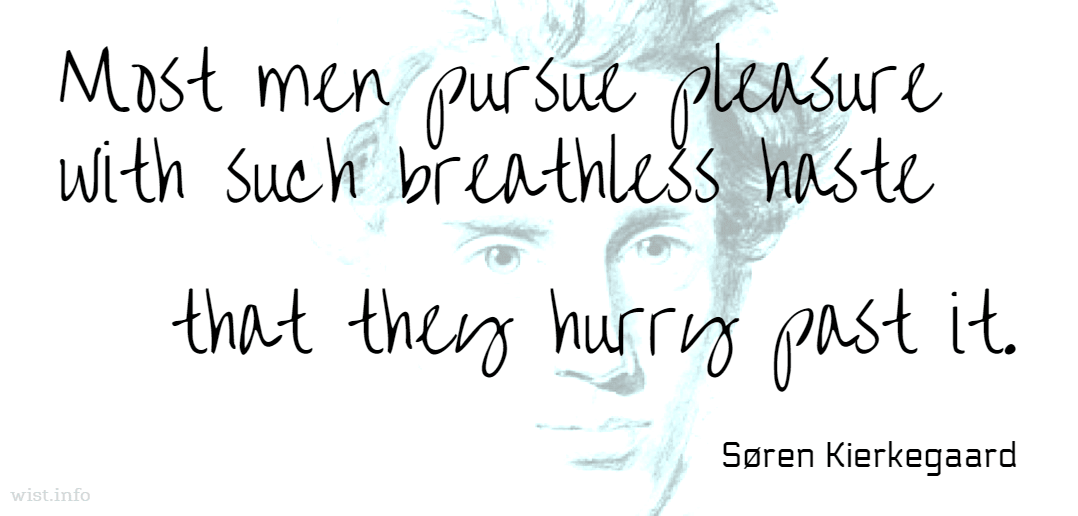If you are looking after happiness don’t take the turnpike, take one ov the byroads, yu will avoid the tollgates, and find it less crowded and dursty.
[If you are looking after happiness, don’t take the turnpike, take one of the byroads; you will avoid the tollgates, and find it less crowded and dusty.]
Josh Billings (1818-1885) American humorist, aphorist [pseud. of Henry Wheeler Shaw]
Everybody’s Friend, Or; Josh Billing’s Encyclopedia and Proverbial Philosophy of Wit and Humor, ch. 132 “Affurisms: Chips” (1874)
(Source)
Quotations about:
pursuit of happiness
Note not all quotations have been tagged, so Search may find additional quotes on this topic.
Whatever creates or increases happiness or some part of happiness, we ought to do; whatever destroys or hampers happiness, or gives rise to its opposite, we ought not to do.
[τὰ μὲν γὰρ παρασκευάζοντα ταύτην ἢ τῶν μορίων τι, ἢ μεῖζον ἀντ᾽ ἐλάττονος ποιοῦντα, δεῖ πράττειν, τὰ δὲ φθείροντα ἢ ἐμποδίζοντα ἢ τὰ ἐναντία ποιοῦντα μὴ πράττειν.]
Aristotle (384-322 BC) Greek philosopher
Rhetoric [Ῥητορική; Ars Rhetorica], Book 1, ch. 5, sec. 2 (1.5.2) / 1360b.11 (350 BC) [tr. Roberts (1924)]
(Source)
(Source (Greek)). Alternate translations:
For it behoves us to perform those acts which procure [happiness], or any one of its constituent parts, or which, when it is little, render it greater; but not to perform those which destroy, or obstruct it, or produce its contraries.
[Source (1847)]
We needs do the things which procure [happiness] or any of its constituents, or which render it greater from having been less, and refrain from doing the things which destroy or impede it, or produce its opposites.
[tr. Buckley (1850)]
Since we ought to do those things which tend to create [Happiness] or any one of its parts, or to increase that part; but we ought not do those things which corrupt, or hinder it, or produce its opposite.
[tr. Jebb (1873)]
For one should do the things which procure happiness or one of its parts, or increase instead of diminishing it, and avoid doing those things which destroy or hinder it or bring about what is contrary to it.
[tr. Freese (1926)]
After all, we are bound to act in a way that creates the conditions for happiness or one of its constituents, or at any rate increases rather than diminishes it, and to avoid doing things that destroy or hinder it or have outcomes that oppose it.
[tr. Waterfield (2018)]
He who has so little knowledge of human nature, as to seek happiness by changing any thing but his own dispositions, will waste his life in fruitless efforts, and multiply the griefs which he purposes to remove.
Samuel Johnson (1709-1784) English writer, lexicographer, critic
The Rambler, #6 (7 Apr 1750)
(Source)
Phileas Fogg had won his wager, and had made his journey around the world in eighty days. To do this he had employed every means of conveyance — steamers, railways, carriages, yachts, trading-vessels, sledges, elephants. The eccentric gentleman had throughout displayed all his marvellous qualities of coolness and exactitude. But what then? What had he really gained by all this trouble? What had he brought back from this long and weary journey?
Nothing, say you? Perhaps so; nothing but a charming woman, who, strange as it may appear, made him the happiest of men!
Truly, would you not for less than that make the tour around the world?
[Phileas Fogg avait gagné son pari. Il avait accompli en quatre-vingts jours ce voyage autour du monde! Il avait employé pour ce faire tous les moyens de transport, paquebots, railways, voitures, yachts, bâtiments de commerce, traîneaux, éléphant. L’excentrique gentleman avait déployé dans cette affaire ses merveilleuses qualités de sang-froid et d’exactitude. Mais après ? Qu’avait-il gagné à ce déplacement? Qu’avait-il rapporté de ce voyage?
Rien, dira-t-on? Rien, soit, si ce n’est une charmante femme, qui — quelque invraisemblable que cela puisse paraître — le rendit le plus heureux des hommes!
En vérité, ne ferait-on pas, pour moins que cela, le Tour du Monde?]
Jules Verne (1828-1905) French novelist, poet, playwright
Around the World in Eighty Days, ch. 37 (1873)
(Source)
No matter how dull, or how mean, or how wise a man is, he feels that happiness is his indisputable right.
The only freedom which deserves the name, is that of pursuing our own good in our own way, so long as we do not attempt to deprive others of theirs, or impede their efforts to obtain it. Each is the proper guardian of his own health, whether bodily, or mental and spiritual. Mankind are greater gainers by suffering each other to live as seems good to themselves, than by compelling each to live as seems good to the rest.
John Stuart Mill (1806-1873) English philosopher and economist
On Liberty, ch. 1 “Introductory” (1859)
(Source)
We hold these truths to be sacred & undeniable; that all men are created equal & independant, that from that equal creation they derive rights inherent & inalienable, among which are the preservation of life, & liberty, & the pursuit of happiness; that to secure these ends, governments are instituted among men, deriving their just powers from the consent of the governed; that whenever any form of government shall become destructive of these ends, it is the right of the people to alter or to abolish it, & to institute new government, laying it’s foundation on such principles & organising it’s powers in such form, as to them shall seem most likely to effect their safety & happiness.
Thomas Jefferson (1743-1826) American political philosopher, polymath, statesman, US President (1801-09)
“Declaration of Independence,” original rough draft (Jun 1776)
(Source)
Compare to the final version, as modified and adopted by the Continental Congress.









